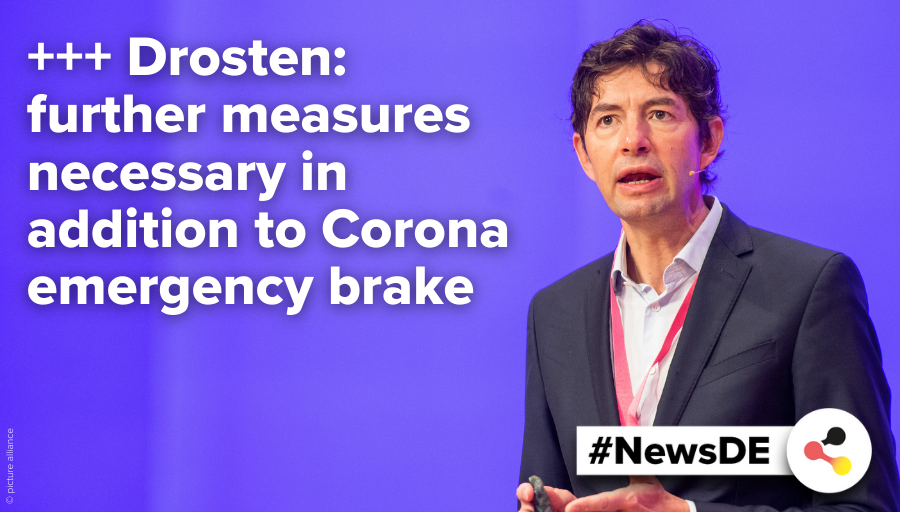The German virologist Professor Dr. Christian Drosten is THE face of the current corona crisis! The weekly magazine Stern even ran the headline in March 2020: “The coronavirus has made virologist Christian Drosten the most sought-after man in the Republic, and a star.”1 For it was Christian Drosten who developed the PCR Corona test in. The latest tweets from @cdrosten.
By Simone Schamann Editing, merger and translation of two articles by FOS-SA Admin
11.1k Followers, 52 Following, 301 Posts - See Instagram photos and videos from Prof. Charity Drosten (@charitydrosten). #HaltDieFresseBild, #allesdichtmachen, Schauspieler, #niewiederaufmachen, #HaltDieFresseSpringerPresse - Today's top Twitter trends and hashtags at Germany. Find what's trending now in your city, country or worldwide. 22 renowned, international scientists have subjected the study by Cornam et. Al, in which Prof. Drosten played a major role, which was fundamental for the establishment of the SARS-CoV-2-PCR test, to an independent peer review process. They came to a damning verdict: the study contains nine serious scientific errors and three minor inaccuracies. The scientists.
Lawyer Beate Bahner’s client refused to take a PCR test when she returned from abroad. “She had – as prescribed – put herself into quarantine,” said Bahner. “Then, however, refused to do a PCR test on top of that.” The woman had therefore received a fine of 125 euros from the legal office and appealed against it. First on her own, then with the help of the well-known lawyer.
In what is actually a marginal fine proceedings, the Heidelberg lawyer Beate Bahner had requested the Charité chief virologist Prof. Christian Drosten as an expert at the Heidelberg district court. Reason: It’s about his specialty, the PCR test. “As an appraiser, I naturally wanted to have the best,” . But she didn’t have much hope that it would work.
Weeks later, a decision arrives from the local court. “I almost forgot about the case,” says Bahner. Then the surprise: “The judge accepted my suggestion and actually commissioned Professor Drosten with a written report. That made me happy! “

Their argumentation has been propagated by the lateral thinking movement for months: The PCR test is an established diagnostic tool, but – in short, because it is too sensitive – it cannot detect an acute infection within the meaning of the Infection Protection Act. Conversely, according to Bahner in her objection letter to the Heidelberg district office, the PCR test is therefore unsuitable for detecting the absence of an infection.
“In order to clarify the matter, we therefore ask Prof. Christian Drosten to invite the questioning about the ability, reliability and suitability to determine Sars-COV2 infections via the Charité in Berlin,” said Bahner in his letter from November 2020. ” If, contrary to expectations, it turns out that the PCR test can detect pathogens and an acute infection at the same time, my client will be happy to have a corresponding PCR test carried out. “
At the beginning of February the answer – in the form of an official decision by the Heidelberg District Court: “A written expert opinion should be collected for the defense lawyer’s claim that a PCR test cannot detect an infection within the meaning of Section 2 of the Infection Protection Act. The following is determined as an expert according to the application: Mr. Prof. Dr. Drosten, Charité Berlin. “


“That was a surprise,” says Beate Bahner in an interview with Nordkurier. “And it is above all a statement by the judge that he takes my doubts about the effectiveness of the PCR test with regard to infection seriously.” Could the judge have rejected the application? Bahner: “He could have chosen another expert. In an administrative offense procedure for 125 euros, he did not necessarily have to commission Drosten. “
The question remains whether Drosten is doing his job. The Nordkurier asked the Charité about this. A clinic spokeswoman: “The matter has already been discussed here – an answer from Professor Drosten is still pending.” “It can of course be the case that Prof. Drosten cancels due to time constraints,” says lawyer Bahner. “Nevertheless, his appointment as an expert has already shown that there may be something wrong with the test.”
The lawyer can also imagine that the matter will be deliberately delayed or that the fine will simply be withdrawn in the near future in order to undermine the clarification of the question of the suitability of the PCR test. Bahner to the Nordkurier: “That would be regrettable, but also okay for me. The decision alone made us lawyers very happy and sets an example. “
In an interview from 2014, in which Charité virologist Drosten was asked by the magazine “Wirtschaftswoche” about the MERS virus, which was rampant at the time, he himself said on the subject of PCR tests: “The method is so sensitive that it contains a single genetic molecule can detect this virus. If, for example, such a pathogen flits over the nasal mucous membrane of a nurse for a day without becoming ill or noticing anything, then it is suddenly a Mers case. Where previously terminally ill were reported, now suddenly mild cases and people who are actually very healthy are included in the reporting statistics. “
If Drosten accepts the task, it would be the first time that Germany’s corona fronts clash in a court case. And that could be exciting. Too exciting for the scientist? As of Tuesday, the Charité has not commented on how Christian Drosten wants to deal with the matter. According to a spokeswoman, the Heidelberg district court has not yet received an acceptance or rejection from the Charité professor.
By Simone Schamann Editing, merger and translation of two articles by FOS-SA Admin
Lawyer Beate Bahner’s client refused to take a PCR test when she returned from abroad. “She had – as prescribed – put herself into quarantine,” said Bahner. “Then, however, refused to do a PCR test on top of that.” The woman had therefore received a fine of 125 euros from the legal office and appealed against it. First on her own, then with the help of the well-known lawyer.
In what is actually a marginal fine proceedings, the Heidelberg lawyer Beate Bahner had requested the Charité chief virologist Prof. Christian Drosten as an expert at the Heidelberg district court. Reason: It’s about his specialty, the PCR test. “As an appraiser, I naturally wanted to have the best,” . But she didn’t have much hope that it would work.
Weeks later, a decision arrives from the local court. “I almost forgot about the case,” says Bahner. Then the surprise: “The judge accepted my suggestion and actually commissioned Professor Drosten with a written report. That made me happy! “
Their argumentation has been propagated by the lateral thinking movement for months: The PCR test is an established diagnostic tool, but – in short, because it is too sensitive – it cannot detect an acute infection within the meaning of the Infection Protection Act. Conversely, according to Bahner in her objection letter to the Heidelberg district office, the PCR test is therefore unsuitable for detecting the absence of an infection.
Twitter Drosten Bild
“In order to clarify the matter, we therefore ask Prof. Christian Drosten to invite the questioning about the ability, reliability and suitability to determine Sars-COV2 infections via the Charité in Berlin,” said Bahner in his letter from November 2020. ” If, contrary to expectations, it turns out that the PCR test can detect pathogens and an acute infection at the same time, my client will be happy to have a corresponding PCR test carried out. “
Dr Christian Drosten
At the beginning of February the answer – in the form of an official decision by the Heidelberg District Court: “A written expert opinion should be collected for the defense lawyer’s claim that a PCR test cannot detect an infection within the meaning of Section 2 of the Infection Protection Act. The following is determined as an expert according to the application: Mr. Prof. Dr. Drosten, Charité Berlin. “
“That was a surprise,” says Beate Bahner in an interview with Nordkurier. “And it is above all a statement by the judge that he takes my doubts about the effectiveness of the PCR test with regard to infection seriously.” Could the judge have rejected the application? Bahner: “He could have chosen another expert. In an administrative offense procedure for 125 euros, he did not necessarily have to commission Drosten. “
The question remains whether Drosten is doing his job. The Nordkurier asked the Charité about this. A clinic spokeswoman: “The matter has already been discussed here – an answer from Professor Drosten is still pending.” “It can of course be the case that Prof. Drosten cancels due to time constraints,” says lawyer Bahner. “Nevertheless, his appointment as an expert has already shown that there may be something wrong with the test.”
The lawyer can also imagine that the matter will be deliberately delayed or that the fine will simply be withdrawn in the near future in order to undermine the clarification of the question of the suitability of the PCR test. Bahner to the Nordkurier: “That would be regrettable, but also okay for me. The decision alone made us lawyers very happy and sets an example. “
In an interview from 2014, in which Charité virologist Drosten was asked by the magazine “Wirtschaftswoche” about the MERS virus, which was rampant at the time, he himself said on the subject of PCR tests: “The method is so sensitive that it contains a single genetic molecule can detect this virus. If, for example, such a pathogen flits over the nasal mucous membrane of a nurse for a day without becoming ill or noticing anything, then it is suddenly a Mers case. Where previously terminally ill were reported, now suddenly mild cases and people who are actually very healthy are included in the reporting statistics. “
If Drosten accepts the task, it would be the first time that Germany’s corona fronts clash in a court case. And that could be exciting. Too exciting for the scientist? As of Tuesday, the Charité has not commented on how Christian Drosten wants to deal with the matter. According to a spokeswoman, the Heidelberg district court has not yet received an acceptance or rejection from the Charité professor.
